

|
When fall comes, I must admit that my rhododendrons take a back seat
and my focus shifts to the Japanese Maples. There are over 160 species of maples including
several native to the Eastern United states. In the Southern Appalachians, the Red Maple,
Acer rubrum, and the Sugar Maple, Acer saccharum, bring thousands of
"leaf peepers" to the mountains to admire the autumn color in our forests.
This article, however, will focus primarily on a single species from Japan, Acer palmatum. It is smaller in stature so it makes wonderful companion plant in the rhododendron garden. The variations in leaf shape, plant habit, and fall color are amazing. The brilliant shades of red, orange and yellow when the maple trees turn color make them the stars of the autumn garden. The dark green leaves of the rhododendrons provide excellent contrast to the fall maple foliage so the landscape effect can be truly spectacular. Japanese Maples provide year-round interest. In early spring, the expanding foliage can be colorful shades of red, coral, gold, or pink. During the growing season, some forms maintain leaf color throughout the season. There are many varied leaf forms that can add interesting textures to the garden. During the winter, mature plants can provide very interesting and artistic branch structures. They make excellent container plants and Bonsai subjects as well. Some of the other species are very popular, too. The Paper Bark Maple, Acer griseum, with its peeling brown bark always attracts attention. I love my 'Full Moon' cultivar, a selection of Acer shirasawanum that sends out peach colored new growth in spring and the rounded leaves hold a chartreuse color all season. Acer japonicum has some wonderful leaf forms, too. Unfortunately, Acer palmatum is not as winter hardy as some species so some of our ARS members who live in more northern climates like Betty Ann Addison in Michigan relies on the Korean Maple, Acer pseudosieboldiana. It is hardy in Zone 4. Public gardens are great places to see mature maples in the landscape. Longwood and Winterthur are 2 to 3 hours from my home and they have some spectacular maples. I have been to Planting Fields Arboretum on Long Island occasionally and they have some magnificent specimens. The U.S. National Arboretum is just across the Potomac River from me, only 25 minutes away. I enjoyed visiting often to admire the various collections. Naturally, my first draw is the Azalea Collection. However, the National Bonsai and Penjing Museum has some magnificent dwarf trees that are centuries old. They have a wonderful display of Satsuki Azalea Bonsai plants that are usually at peak bloom in early June but in the fall, their deciduous Bonsai trees including many Japanese Maples are very colorful. The Rhododendron Species Botanical Garden in Federal Way, Washington, has an excellent Bonsai Collection and I always try to visit when I am on the West Coast.
Of course, many of our chapter members have used Japanese maples in their home landscapes.
When we have garden tours in the spring, our focus will be on the azaleas and
rhododendrons in bloom. However, see if you can get an invite to return in the fall
for an entirely different display. |
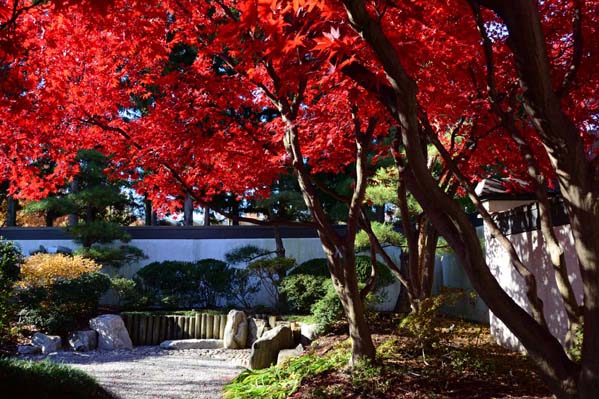
Japanese Maples in the Bonsai Pavilion at the U.S. National Arboretum 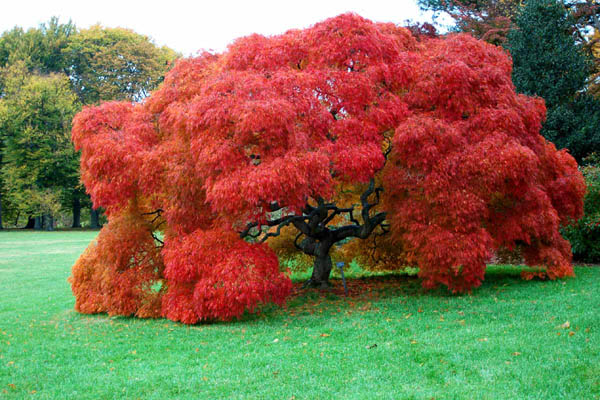
Large Acer palmatum dissectum at Planting Fields Arboretum | |
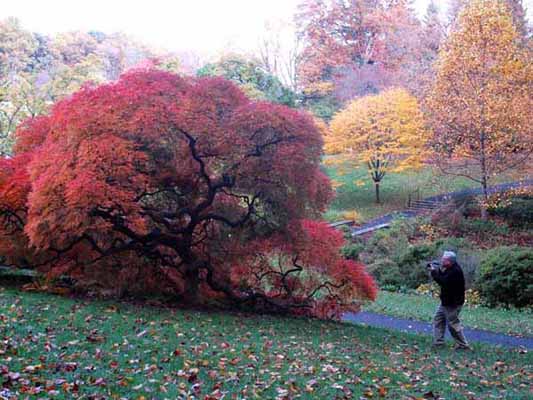
|
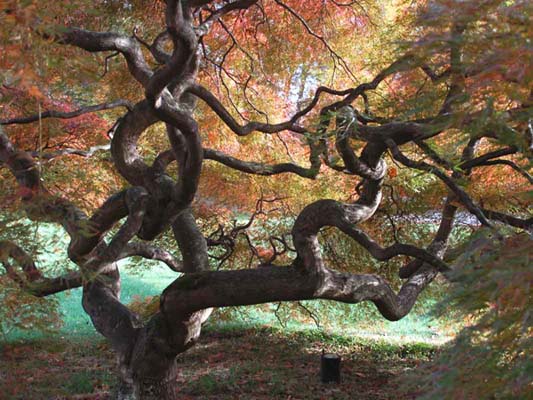
| |
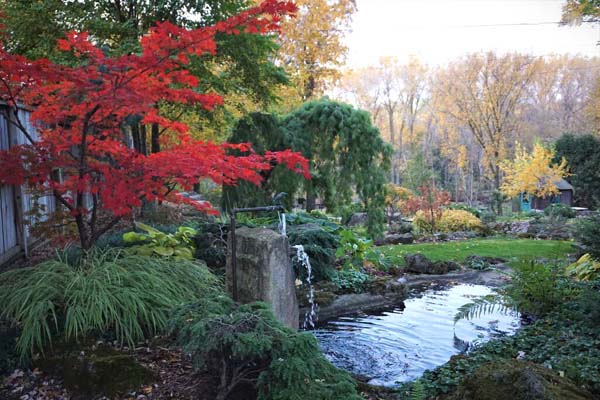
|
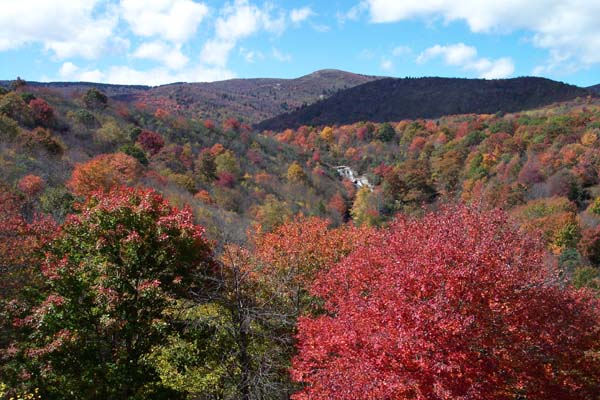
| |

| ||
|
Most of our local garden centers only carry a few Japanese maple varieties
so it is necessary to go to a specialist to find interesting cultivars. I brought
back some of my first maples from Greer Gardens, plants I purchased during a West
Coast ARS Convention.
Some of our chapter members have wonderful collections, such as Norm and Jean Beaudry whose garden was on tour when we hosted the ARS Convention in the Washington DC area in 2006. They have one of the best rhododendron collections in the region, but they also have a wonderful collection of Japanese maples and dwarf conifers, too. |
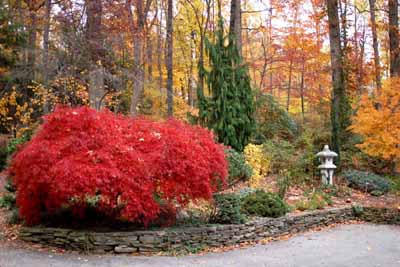
|
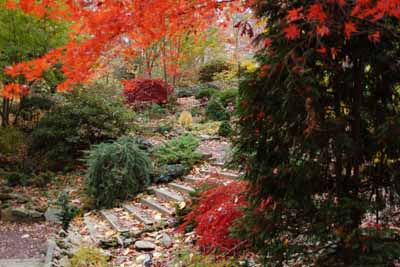
|
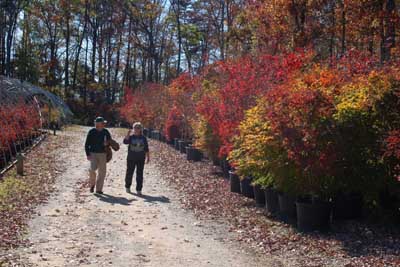
|
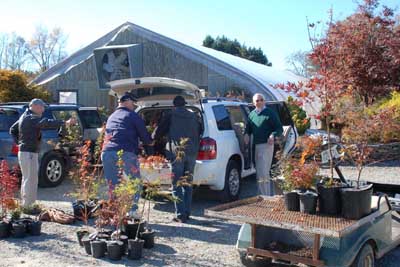
| One of the hardest things to do is decide which cultivars to buy since most of us want every plant we see. Members of our chapter have twice taken field trips to a wholesale Japanese Maple nursery during peak foliage season. They have nearly 400 varieties and it is a wonderful education just to see so many rare cultivars we didnít know existed. We had hoped to do that again this year but the virus pandemic halted most of our plans this year. Some wholesale companies have allowed plant societies to submit group orders, too. |
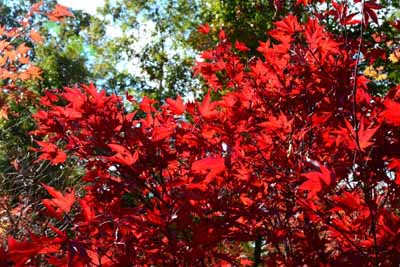
|
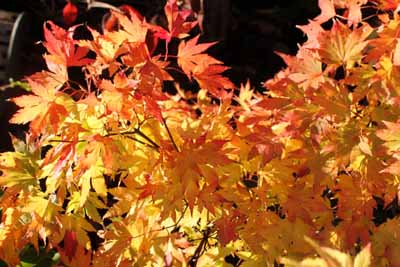
|
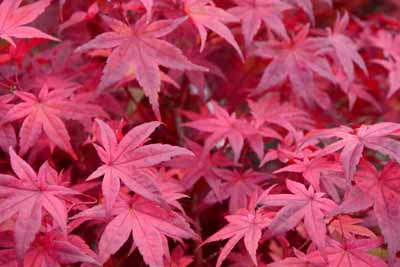 'Shingeshijo'
'Shingeshijo'
| |||||||||
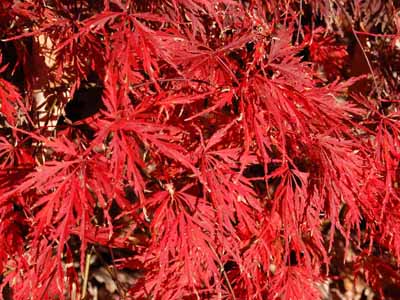
|
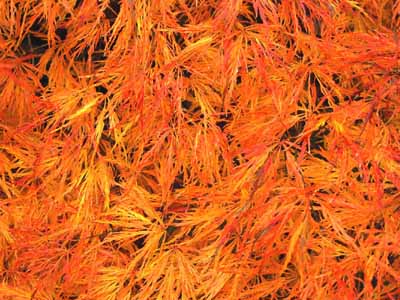
|
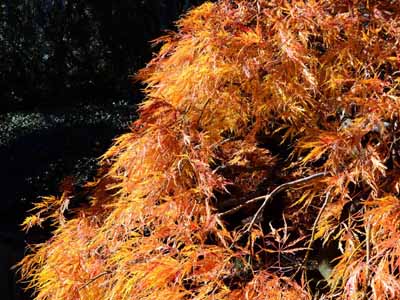 Dissectum Cultivar 'Flavescens'
Dissectum Cultivar 'Flavescens'
| |||||||||
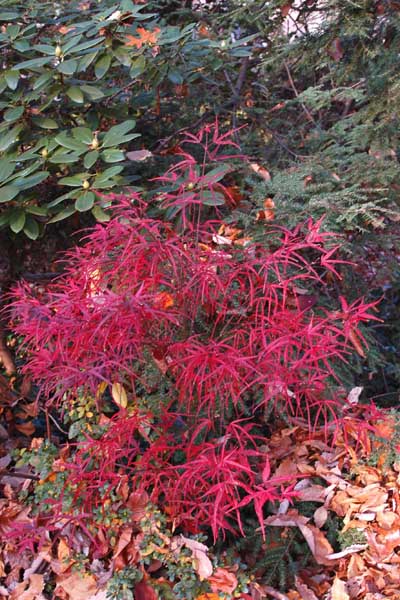 Strap Leaf Cultivar 'Atrolineare'
Strap Leaf Cultivar 'Atrolineare'
|
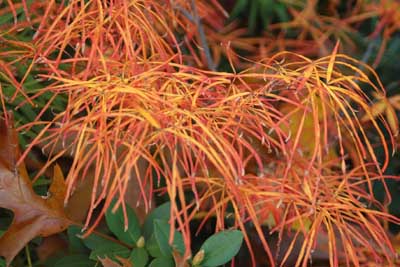 Strap Leaf Cultivar 'Fukinagashi'
Strap Leaf Cultivar 'Fukinagashi'
|
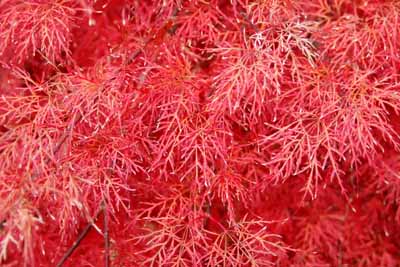 Thread Leaf Cultivar 'Red Feathers'
Thread Leaf Cultivar 'Red Feathers'
| 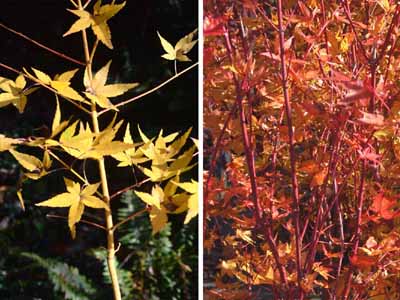
Colored Bark: 'Bijou' (yellow), 'Beni Kawa' (Coral)
| 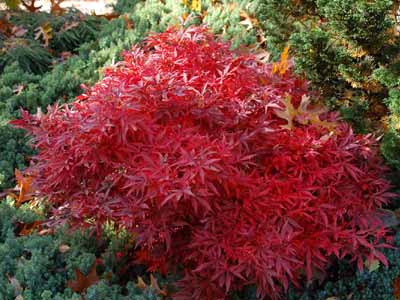
Dwarf Maple 'Shaina'
| 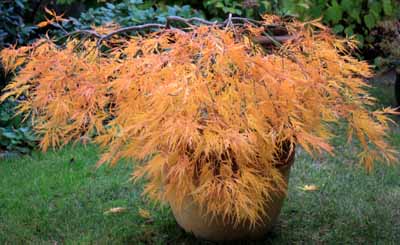
| 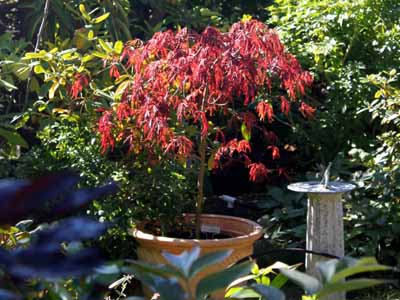
Container Plant 'Crimson Queen' Photo L. Derkach
| 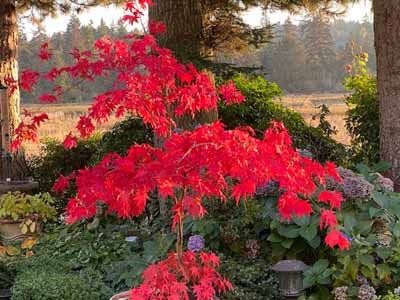
Container Plant 'Osakazuki' Photo L. Derkach
| 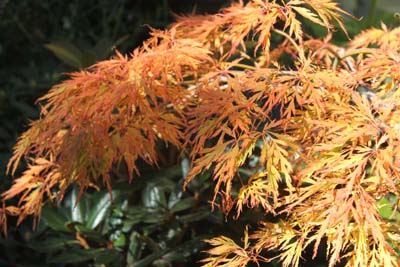
| 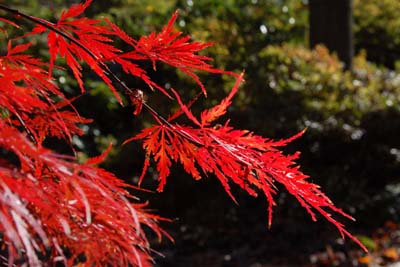
'Crimson Queen' Photo D. Hyatt
| 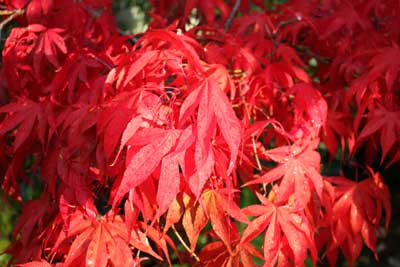
'Osakazuki' Photo L. Derkach
| |
|
Not all plants with great fall color are Japanese Maples. Here are some others you might
want to include in your garden. Among my favorite native trees is the Dogwood. It has lovely
white to pink blossoms in the spring, but red fall foliage and red berries in the fall.
The Ginkgo tree has the best yellow fall foliage but be careful about tree selection. The Ginkgo has both male and female trees, so be sure to avoid planting female trees near the home because the fleshy fruit when it is ripe produces an obnoxious smell. The Sourwood tree (Oxydendron) can be difficult to transplant but it is a lovely ornamental. The hanging, greenish-white panicles left from the blossoms are very attractive against the red foliage. Euonymous alatus, or the Burning Bush shrub attracts a lot of attention when the foliage turns in the fall but the birds spread its seed and it can become invasive. The white Enkianthus is much better behaved and has lovely white bell-shaped blossoms in spring and brilliant red fall foliage. |
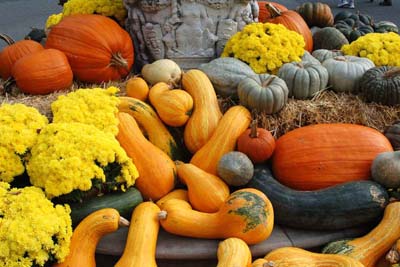
|
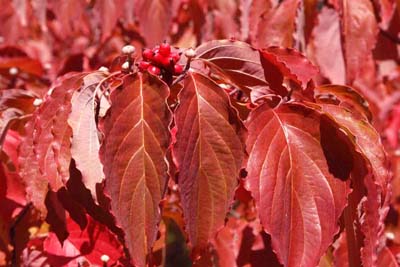
|
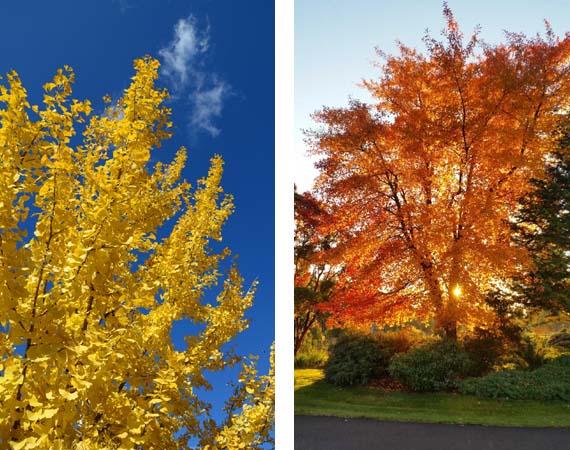 Ginkgo (photo D. Hyatt) and Nyssa (photo M. Stewart)
Ginkgo (photo D. Hyatt) and Nyssa (photo M. Stewart)
|
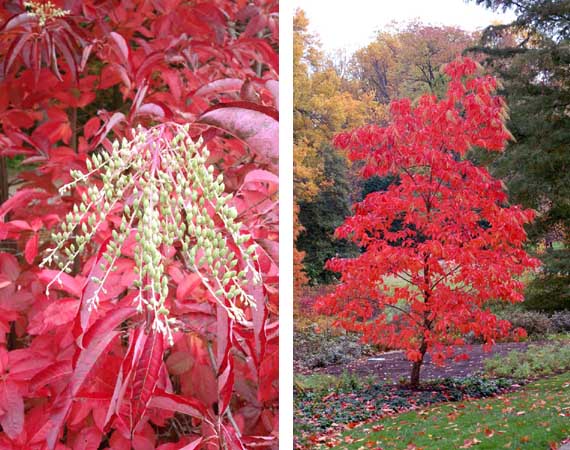
|
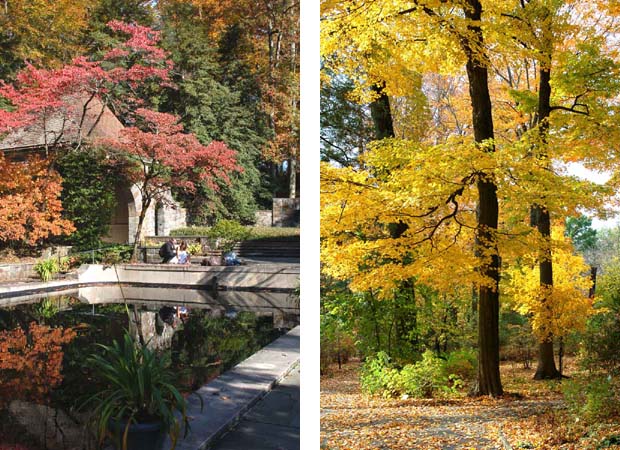
|
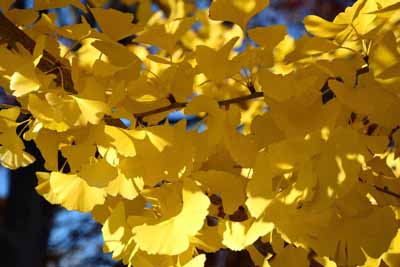 Ginkgo foliage turns bright yellow but be careful of the stinky fruit from female plants.
Ginkgo foliage turns bright yellow but be careful of the stinky fruit from female plants.
|
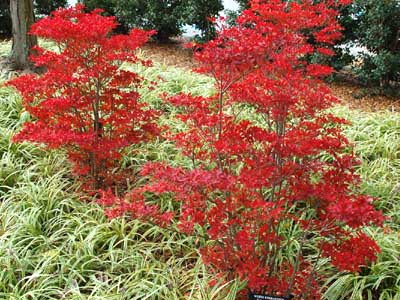
|
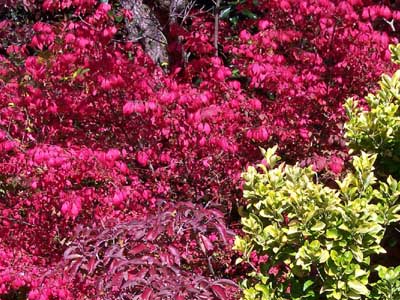
|
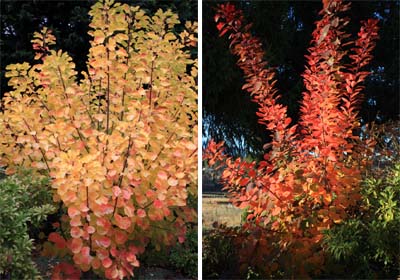 Cotinus 'Golden Spirit' and 'Grace' (photo L. Derkach)
Cotinus 'Golden Spirit' and 'Grace' (photo L. Derkach)
|
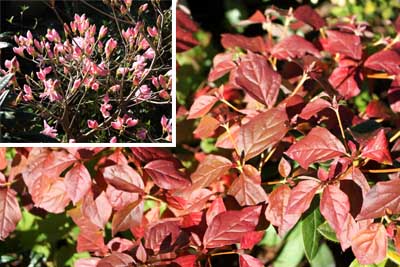
|
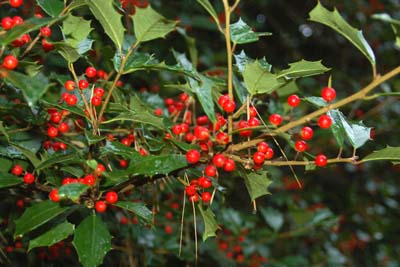
|
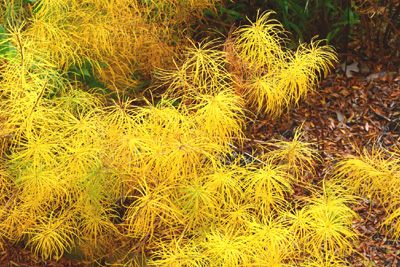 The foliage of the Blue Star perennial, Amsonia hubrechtii, turns bright yellow
in the fall
The foliage of the Blue Star perennial, Amsonia hubrechtii, turns bright yellow
in the fall
|
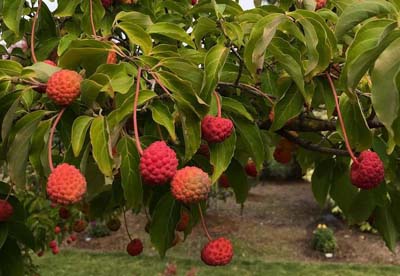
|
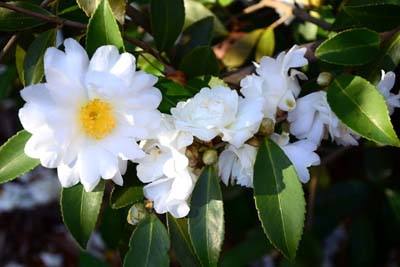
|